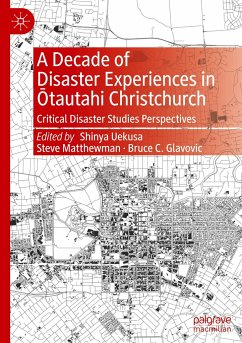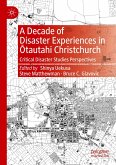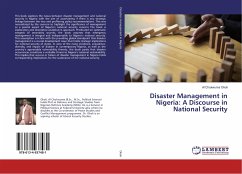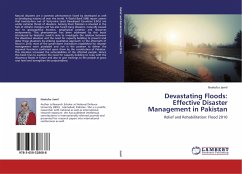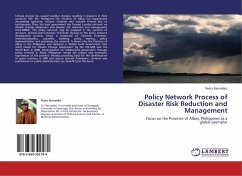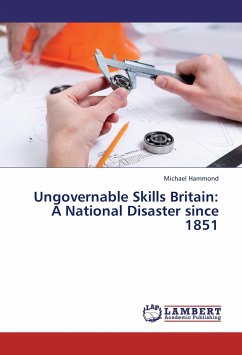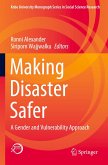A Decade of Disaster Experiences in ¿tautahi Christchurch
Critical Disaster Studies Perspectives
Herausgegeben:Uekusa, Shinya; Matthewman, Steve; Glavovic, Bruce C.
A Decade of Disaster Experiences in ¿tautahi Christchurch
Critical Disaster Studies Perspectives
Herausgegeben:Uekusa, Shinya; Matthewman, Steve; Glavovic, Bruce C.
- Gebundenes Buch
- Merkliste
- Auf die Merkliste
- Bewerten Bewerten
- Teilen
- Produkt teilen
- Produkterinnerung
- Produkterinnerung
This book critically surveys a decade of disasters in tautahi Christchurch. It brings together a diverse range of authors, disciplinary approaches and topics, to reckon with the events that commenced with the 2010-2011 Canterbury earthquake sequence. Each contribution tackles its subject matter through the frame of Critical Disaster Studies (CDS). The events and the subsequent recovery provide a once-in-a-lifetime opportunity to learn from a series of concatenating urban disasters in order to prepare us for our future on an urban planet facing unprecedented environmental pressures. The book…mehr
Andere Kunden interessierten sich auch für
![A Decade of Disaster Experiences in ¿tautahi Christchurch A Decade of Disaster Experiences in ¿tautahi Christchurch]() A Decade of Disaster Experiences in ¿tautahi Christchurch108,99 €
A Decade of Disaster Experiences in ¿tautahi Christchurch108,99 €![Disaster Management in Nigeria: A Discourse in National Security Disaster Management in Nigeria: A Discourse in National Security]() Al Chukwuma OkoliDisaster Management in Nigeria: A Discourse in National Security38,99 €
Al Chukwuma OkoliDisaster Management in Nigeria: A Discourse in National Security38,99 €![Devastating Floods: Effective Disaster Management in Pakistan Devastating Floods: Effective Disaster Management in Pakistan]() Neelofur JamilDevastating Floods: Effective Disaster Management in Pakistan40,99 €
Neelofur JamilDevastating Floods: Effective Disaster Management in Pakistan40,99 €![Policy Network Process of Disaster Risk Reduction and Management Policy Network Process of Disaster Risk Reduction and Management]() Pedro BernaldezPolicy Network Process of Disaster Risk Reduction and Management37,99 €
Pedro BernaldezPolicy Network Process of Disaster Risk Reduction and Management37,99 €![Ungovernable Skills Britain: A National Disaster since 1851 Ungovernable Skills Britain: A National Disaster since 1851]() Michael HammondUngovernable Skills Britain: A National Disaster since 185138,99 €
Michael HammondUngovernable Skills Britain: A National Disaster since 185138,99 €![A Decade in Sino-Soviet Diplomacy A Decade in Sino-Soviet Diplomacy]() A Decade in Sino-Soviet Diplomacy414,99 €
A Decade in Sino-Soviet Diplomacy414,99 €![Making Disaster Safer Making Disaster Safer]() Making Disaster Safer93,99 €
Making Disaster Safer93,99 €-
-
-
This book critically surveys a decade of disasters in tautahi Christchurch. It brings together a diverse range of authors, disciplinary approaches and topics, to reckon with the events that commenced with the 2010-2011 Canterbury earthquake sequence. Each contribution tackles its subject matter through the frame of Critical Disaster Studies (CDS). The events and the subsequent recovery provide a once-in-a-lifetime opportunity to learn from a series of concatenating urban disasters in order to prepare us for our future on an urban planet facing unprecedented environmental pressures. The book focuses on the production of vulnerability, the human dimensions of disaster, the Indigenous response to disasters and the practical lessons that can be drawn from them.
Produktdetails
- Produktdetails
- Verlag: Palgrave Macmillan / Springer Nature Singapore / Springer, Berlin
- Artikelnr. des Verlages: 978-981-16-6862-3
- 1st ed. 2022
- Seitenzahl: 432
- Erscheinungstermin: 14. Februar 2022
- Englisch
- Abmessung: 216mm x 153mm x 28mm
- Gewicht: 668g
- ISBN-13: 9789811668623
- ISBN-10: 9811668620
- Artikelnr.: 62526415
- Herstellerkennzeichnung Die Herstellerinformationen sind derzeit nicht verfügbar.
- Verlag: Palgrave Macmillan / Springer Nature Singapore / Springer, Berlin
- Artikelnr. des Verlages: 978-981-16-6862-3
- 1st ed. 2022
- Seitenzahl: 432
- Erscheinungstermin: 14. Februar 2022
- Englisch
- Abmessung: 216mm x 153mm x 28mm
- Gewicht: 668g
- ISBN-13: 9789811668623
- ISBN-10: 9811668620
- Artikelnr.: 62526415
- Herstellerkennzeichnung Die Herstellerinformationen sind derzeit nicht verfügbar.
Shinya Uekusa is a disaster sociologist and most recently works as an Assistant Professor in the School of Culture and Society at Aarhus University in Denmark. He has returned to Aotearoa and joined Massey University's Health and Ageing Research Team (HART) to work on the Health Research Council of New Zealand (HRC) funded research project on the impacts of the COVID-19 pandemic on older people in Aotearoa. His main research interests are in (im)migration, the sociology of language, and disaster sociology, particularly focusing on how the socially disadvantaged groups such as (im)migrants, refugees and linguistic minorities experience and cope with cultural, economic, environmental, political and social challenges. Steve Matthewman is an Associate Professor in Sociology at the University of Auckland. His last book on disasters was Disasters, Risks and Revelation: Making Sense of Our Times (2015). He also co-edited Exploring Society: Sociology for New Zealand Students (Auckland University Press, 2019) with Ruth McManus, and the third edition of Being Sociological (Red Globe Press) with Bruce Curtis and David Mayeda. His current research project is a three-year Royal Society of New Zealand-funded work "Power Politics: Electricity and Sustainability in Post-Disaster ¿tautahi (Christchurch)". The broad focus of this research is on how we build sustainability into the city. The narrow focus is on the place of renewable energy in this process. Bruce C. Glavovic is a Professor at Massey University. For much of the last decade his research has focused on the role of governance and natural hazards planning in addressing vulnerability and risk in a changing climate. He is Senior Editor for the Oxford Research Encyclopedia of Natural Hazard Science and co-Editor-in-Chief of the journal Ocean & Coastal Management. He was a Coordinating Lead Author for the chapter on sea level rise in a 2019 IPCC Special Report and is a Lead Author and Cross Chapter Paper co-lead in the IPCC's forthcoming Working Group II Sixth Assessment Report.
PART I: Introduction.- 1. Contextualising the decade of disaster experiences in tautahi Christchurch, and the Critical Disaster Studies imperative. By Steve Matthewman, Shinya Uekusa & Bruce Glavovic.- 2. Critical Disaster Studies: The evolution of a paradigm. By Anthony Oliver-Smith.- PART II: Critical framings of disasters.- 3. Elite panic and pathologies of governance before and after the Canterbury earthquake sequence. By Roy Montgomery.- 4. The ruptured city ten years on. By Katie Pickles.- 5. Critical Indigenous Disaster Studies: Doomed to resilience. By Simon Lambert.- 6. Rethinking community resilience: Critical reflections on the last 10 years of the tautahi Christchurch recovery and on-going disasters. By Shinya Uekusa & Raven Cretney.- 7. Every last drop: The fresh water "disaster" in Canterbury. By Matthew Wynyard.- PART III: Critical voices in disasters.- 8. Hazardous times: Adversity, diversity and constructions of collectivity. By Rosemary Du Plessis.- 9. Maori community response and recovery following the Canterbury earthquake sequence. By Suzanne Phibbs, Christine Kenney & Ta Mark Solomon.- 10. Asian migrant worker experiences in tautahi Christchurch. By Arlene Garces-Ozanne, Maria Makabenta-Ikeda & Shinya Uekusa.- 11. Minutes of shaking: Years of litigation. By Jeremy Finn & Elizabeth Toomey.- 12. Sustainability through adversity? The impacts of the earthquake on the greening of death. By Ruth McManus.- PART IV: tautahi as a laboratory for the world: A prelude to the future.- 13. Why don't we "build back better"? The complexities of reconstituting urban form . By Steve Matthewman & Hugh Byrd.- 14. Turn and face the strange: Reflections on creativity following the Canterbury earthquake sequence. By Trudi Cameron.- 15. Planning, governance and a city for the future?. By Eric Pawson.- 16. Lessons for democracy from a decade of disaster. By Bronwyn Hayward & Sam Johnson.
PART I: Introduction.- 1. Contextualising the decade of disaster experiences in tautahi Christchurch, and the Critical Disaster Studies imperative. By Steve Matthewman, Shinya Uekusa & Bruce Glavovic.- 2. Critical Disaster Studies: The evolution of a paradigm. By Anthony Oliver-Smith.- PART II: Critical framings of disasters.- 3. Elite panic and pathologies of governance before and after the Canterbury earthquake sequence. By Roy Montgomery.- 4. The ruptured city ten years on. By Katie Pickles.- 5. Critical Indigenous Disaster Studies: Doomed to resilience. By Simon Lambert.- 6. Rethinking community resilience: Critical reflections on the last 10 years of the tautahi Christchurch recovery and on-going disasters. By Shinya Uekusa & Raven Cretney.- 7. Every last drop: The fresh water "disaster" in Canterbury. By Matthew Wynyard.- PART III: Critical voices in disasters.- 8. Hazardous times: Adversity, diversity and constructions of collectivity. By Rosemary Du Plessis.- 9. Maori community response and recovery following the Canterbury earthquake sequence. By Suzanne Phibbs, Christine Kenney & Ta Mark Solomon.- 10. Asian migrant worker experiences in tautahi Christchurch. By Arlene Garces-Ozanne, Maria Makabenta-Ikeda & Shinya Uekusa.- 11. Minutes of shaking: Years of litigation. By Jeremy Finn & Elizabeth Toomey.- 12. Sustainability through adversity? The impacts of the earthquake on the greening of death. By Ruth McManus.- PART IV: tautahi as a laboratory for the world: A prelude to the future.- 13. Why don't we "build back better"? The complexities of reconstituting urban form . By Steve Matthewman & Hugh Byrd.- 14. Turn and face the strange: Reflections on creativity following the Canterbury earthquake sequence. By Trudi Cameron.- 15. Planning, governance and a city for the future?. By Eric Pawson.- 16. Lessons for democracy from a decade of disaster. By Bronwyn Hayward & Sam Johnson.

